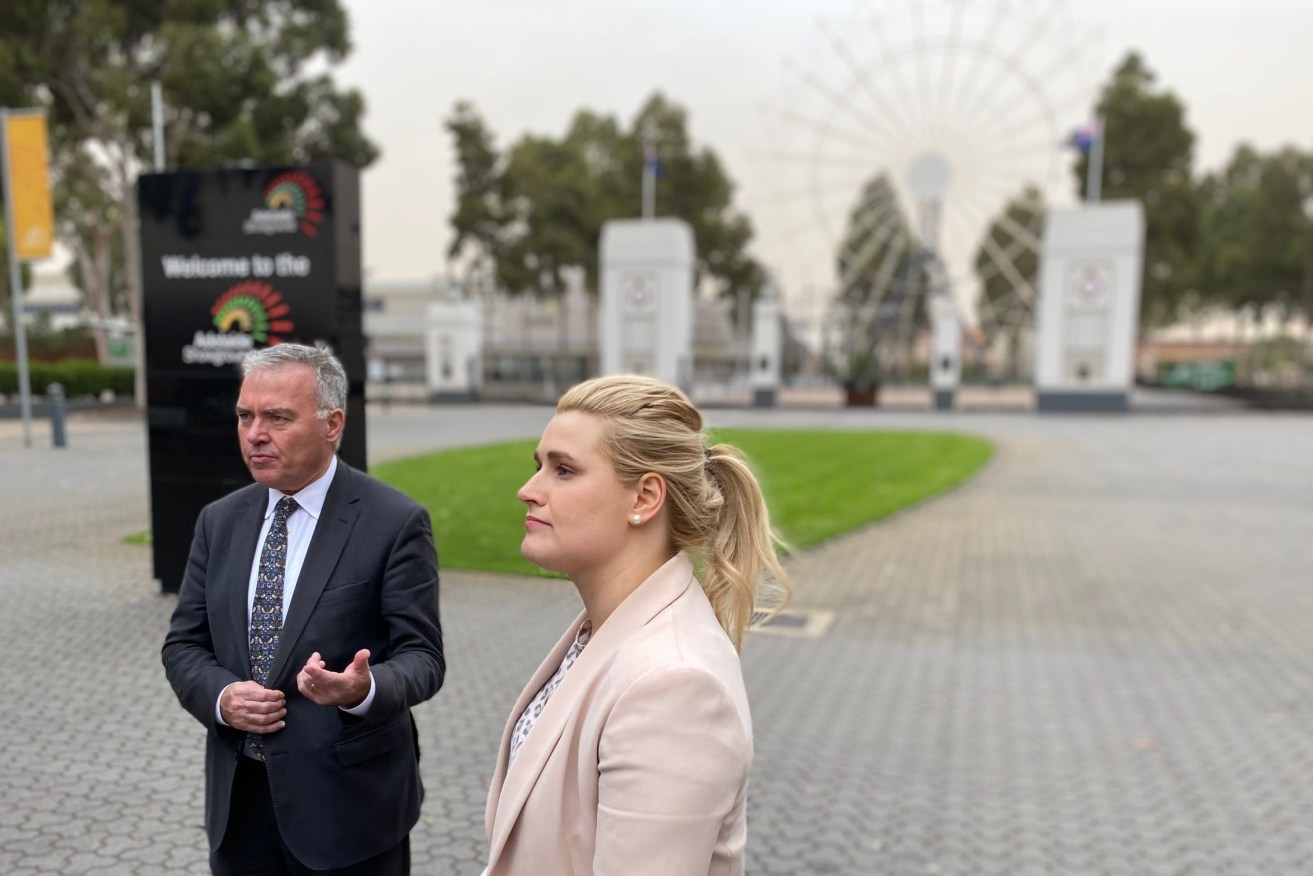Medi-hotel workers refusing vaccine as SA records eight new cases
Up to 15 per cent of workers in South Australian medi-hotels are yet to accept a COVID-19 vaccine injection, health authorities have revealed, as the state today recorded its highest single-day increase of coronavirus cases in quarantine.

Emily Kirkpatrick and Stephen Wade at the showgrounds today.
SA Health today reported eight new cases of COVID-19, for a total of 674 cases notified in South Australia.
It’s the highest single-day increase – outside of the 18 cases recorded at the start of last year’s Parafield cluster – since April 4 last year, before the introduction of hotel quarantine.
The new positives include a child, a woman in her 20s, two women in their 30s, a woman in her 40s, a woman in her 50s, a man in his 20s, and a man in his 30s, all of whom acquired their infections overseas and have been in medi-hotels since their arrival.
There are 13 active cases in SA, including a man in his 40s who remains in a critical but stable condition in intensive care.
It comes as the Government prepares to open its Adelaide Showgrounds vaccination hub on April 30, which Health Minister Stephen Wade said would be a dedicated facility to administer the Pfizer vaccine to eligible people aged under 50.
Deputy chief public health officer Dr Emily Kirkpatrick today said the spike in cases was “nothing to be alarmed about”.
“These individuals are all in hotel quarantine and we’re currently working through that risk assessment process,” she told reporters.
“We will continue to see cases, particularly as the prevalence [of the virus] increases overseas.”
Kirkpatrick said the rollout of the vaccine had so far seen “85 per cent of our hotel quarantine workers” receive at least one jab – “which is a fantastic effort”.
“That’s particularly important because we do have a transient workforce, and it’s important to understand we will see that number fluctuate.”
A further 885 close and family contacts of medi-hotel workers had also “put up their hand” to receive a jab – but Kirkpatrick conceded the majority of the remaining 15 per cent had yet to be convinced to do so.
“We know our highest-risk location is of course in our international travellers and our quarantine pathway, so it’s really important we do what we can to focus our resources and our vaccine on those who are at highest risk,” she said.
While “100 per cent” of workers at the state’s dedicated COVID-positive facility at Tom’s Court had agreed to be vaccinated, “in terms of other hotel quarantine workers, we are continuing to reach out to those workers who so far haven’t rolled up their sleeve to get a vaccine”, Kirkpatrick said.
“We’ll continue to talk with them – our nursing staff have been calling them up, explaining the benefits [and] I’ve also written to the hotel workers as well, explaining why it’s so important to get vaccinated,” she said.
“We know there’s always barriers in terms of people’s ability to get that vaccine – and that might be in terms of shift work or time off – but we’re working with people and their schedules to get that last 15 per cent…
“We have worked through our list, booked people in and now it’s a matter of having those discussions with people who may be a little bit concerned about the vaccine and explaining that this is a very safe vaccine.”
Medi-hotel workers are being given the Pfizer vaccine, due to its three-week turnaround between injections.
“We’re giving people the opportunity in time to understand why it’s important to be vaccinated.”
Kirkpatrick said the nursing and clinical workforce had all taken up the vaccine offer, but noted there were other areas including “housekeeping, food and hospitality, SAPOL [and] the ADF”.
“It’s across the spectrum, and that may be because of medical conditions, concern about the vaccine [but] these individuals would still be across in our different hotels.”
However, she said there was no intention to enforce a mandatory vaccination policy for medi-hotel workers.
“At this point in time we’re not exploring that,” she said.
“We do have a policy position around risk, and it is a matter of having that discussion with someone’s employer around what that risk may be for them…
“We don’t have a state-based mandatory policy and there isn’t a national policy in this area as well – certainly the AHPPC have not set the direction in that area.”
She suggested some had indicated they would consider a vaccination down the track, adding: “People are waiting to see what happens with the vaccine, or what happens with COVID here in the state [but] it’s important for the community and the workers to understand that hotel quarantine is our most at-risk place…
“Of course with those numbers we will have people who have not taken up the vaccine and we’d hope after a period of time – with counselling, with discussion with others – that they’d take up that vaccine.”
Wade similarly echoed the commitment not to mandate a vaccination for hotel workers, saying: “Our health workers are Australian citizens – they have the same commitment from the Australian Government and the South Australian Government as any other Australian citizen, which is that this vaccine is voluntary.”
He noted “we don’t mandate vaccinations for our key workers in terms of the general flu vaccination program”.
“As a general rule, health workers are entitled to the same choice as to whether or not to be vaccinated,” he said.
“I’m not a clinician, I’m a politician, but one of the key factors to remember is the evidence is not in that the COVID vaccines actually stop the risk of transmission – the advice from ATAGI and the AHPPC is not to make it mandatory.”




